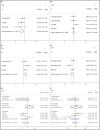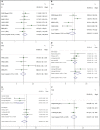Polymorphisms and NIHL: a systematic review and meta-analyses
- PMID: 37396925
- PMCID: PMC10309027
- DOI: 10.3389/fncel.2023.1175427
Polymorphisms and NIHL: a systematic review and meta-analyses
Abstract
Background: Noise-induced hearing loss (NIHL) has always been a global public health problem, which is related to noise exposure and genetic factors. Many researchers have tried to identify the polymorphisms that cause different individuals' susceptibility to NIHL. We conducted a meta-analysis of the most frequently studied polymorphisms to identify those genes that may be associated with NIHL and may provide value in risk prevention.
Methods: PubMed, China National Knowledge Infrastructure (CNKI) database, Embase, Wang Fang, Web of Science and Cochrane library were searched, and qualified studies on the correlation between polymorphism and NIHL susceptibility were screened, and then polymorphisms cited in at least three studies were selected for meta-analysis. Fixed- or random-effects models were used to calculate odds ratios and 95% confidence intervals. Statistical I2 tests and sensitivity analyses were used to detect interstudy heterogeneity and test the statistical stability of overall estimates, respectively. Egger's tests were applied to detect publication bias among included studies. All of the above analyses were performed using stata 17.0.
Results: 64 genes were initially selected and introduced in 74 papers. Among them, 10 genes (and 25 polymorphisms) have been reported in more than 3 papers. Twenty five polymorphisms participated in the meta-analysis. Of the 25 polymorphisms, only 5 were significantly associated with the risk of AR: rs611419 (GRHL2) polymorphism and rs3735715 polymorphism (GRHL2), rs208679 polymorphism (CAT), rs3813346 polymorphism (EYA4) were significantly associated with the susceptibility of NIHL, rs2227956 polymorphism (HSP70) was significantly associated with the susceptibility of white population NIHL, and the remaining 20 gene polymorphisms were not significantly associated with NIHL.
Conclusion: We found polymorphisms that are valuable for the prevention of NIHL and polymorphisms that are not related to NIHL. This is the first step to establish an effective risk prediction system for the population, especially for high-risk groups, which may help us better identify and prevent the occurrence of NIHL. In addition, our research results contribute to the in-depth exploration of NIHL.
Systematic review registration: https://inplasy.com/inplasy-2023-6-0003/, identifier INPLASY202360003.
Keywords: CAT; EYA4; GRHL2; HSP70; meta-analysis; noise induced hearing loss; polymorphism.
Copyright © 2023 Wang, Wang, Xiang, Xiang, Xiong and Zhang.
Conflict of interest statement
The authors declare that the research was conducted in the absence of any commercial or financial relationships that could be construed as a potential conflict of interest.
Figures






Similar articles
-
Association of polymorphisms in the catalase gene with the susceptibility to noise-induced hearing loss: A meta-analysis.Am J Otolaryngol. 2023 Mar-Apr;44(2):103699. doi: 10.1016/j.amjoto.2022.103699. Epub 2022 Dec 5. Am J Otolaryngol. 2023. PMID: 36516529
-
Associations of genetic variations in EYA4, GRHL2 and DFNA5 with noise-induced hearing loss in Chinese population: a case- control study.Environ Health. 2015 Sep 24;14:77. doi: 10.1186/s12940-015-0063-2. Environ Health. 2015. PMID: 26400775 Free PMC article.
-
Association between polymorphisms of heat-shock protein 70 genes and noise-induced hearing loss: A meta-analysis.PLoS One. 2017 Nov 27;12(11):e0188539. doi: 10.1371/journal.pone.0188539. eCollection 2017. PLoS One. 2017. PMID: 29176785 Free PMC article.
-
Association of IL-4 and IL-10 Polymorphisms With Preterm Birth Susceptibility: A Systematic Review and Meta-Analysis.Front Immunol. 2022 Jul 4;13:917383. doi: 10.3389/fimmu.2022.917383. eCollection 2022. Front Immunol. 2022. PMID: 35860261 Free PMC article.
-
Occupational noise-induced hearing loss in China: a systematic review and meta-analysis.BMJ Open. 2020 Sep 28;10(9):e039576. doi: 10.1136/bmjopen-2020-039576. BMJ Open. 2020. PMID: 32988950 Free PMC article.
References
Publication types
LinkOut - more resources
Full Text Sources
Research Materials
Miscellaneous

